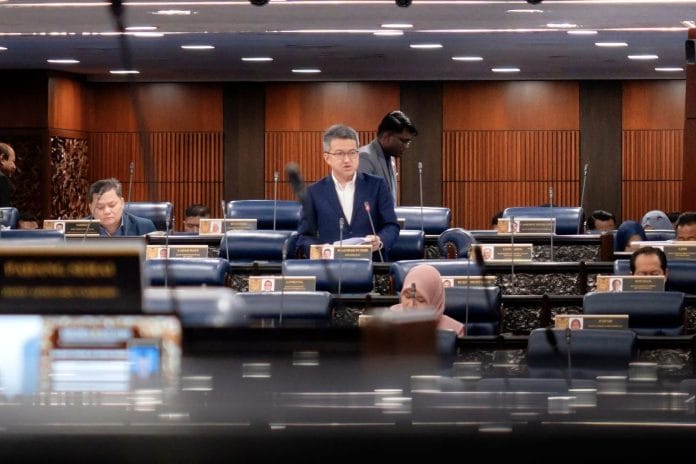Sabah has attracted a total of RM9.05 billion in approved investments within the services, manufacturing and other main sectors from January to June 2023, involving 68 projects in total which expects to create 722 job opportunities.
The key pointer here is that we must never lose sight of the importance Domestic Direct Investment (DDI) places on the Malaysian economy as it’s the main contributor which holds a total approved investment sum of RM8.99 billion (99%), while foreign direct investment (FDI) contributes as much RM61.7 million (1%).
Deputy Investment, Trade and Industry (MITI) Minister Liew Chin Tong said this at the Dewan Rakyat today (Nov 16) in reply to a question raised by Riduan Rubin [TENOM] on the latest amount of high-impact sector-based investments that have been brought in to Sabah and what are the prospects of potential sectors to be developed in the future to make Sabah an industrial powerhouse.
Liew said based on the biodiversity advantages and in terms of availability of raw materials and a strategic position, Sabah has great potential to play a major role with the manufacturing industry and resource-based services sector.
Potential sectors in Sabah within the service industry include tourism; renewable energy (RE); logistics and education; training and maintenance.
As for the manufacturing sector, the coconut-based downstream product industry palm oil, oil and gas, cement and solar components have the potential to provide great impact on Sabah’s economy.
Sabah’s total biomass production from the palm oil industry sector for the year 2021 is as much as 45 million metric tons. Based on palm oil biomass production reports, the biomass sector has potentialto boost Sabah’s economy through investments into clean energy, green industry and downstream industry development local, Liew said.
He told lawmakers that MITI, through The Malaysian Investment Development Authority (MIDA) is always committed in providing support in terms of facilitation and promotion as well as work closely with the Sabah State Economic Planning Unit (UPEN), Ministry of Industrial Development and Entrepreneurship (MIDE) Sabah, Sabah Economic Development and Investment Authority (READY) and related agencies to realise the investment quality in Sabah.
Domestic Direct Investment Initiative (DDI)
Liew said that DDI is an important component in strengthening the landscape investment in the country with the Prime Minister setting DDI as one of the key performance indicators (Key Performance Index – KPI) for total national investment.
The government through MIDA provides a tax incentive package to domestic and foreign manufacturing companies that produce products or carry out activities under the Promotion of Investment 1986 Act which is not specific area or state. This means, investors who wish to invest in Sabah is also eligible to be considered for the incentive package if the product or activity is promoted under the Act
There are also tax incentives provided, as follows:
a. Promotion of Pioneer Status which offers income tax exemption as much as 70% or 100% of the statutory income for a period of 5 or 10 years; or
b. Investment Tax Allowance which is an allowance of 60% or 100% on the amount of capital expenditure that is eligible to be placed in the company within 5 or 10 years.
Liew said, as announced through Budget 2024, the Government has also introduced the Reinvestment Allowance (RA) incentive which are for existing companies whose RA eligibility period have expired. They can now continue to increase capacity and investment in high value activities as outlined under NIMP 2030. The eligible RA rate will be determined based on the success approach (outcome-based approach) and consists of two Tiers (levels):
a. If the company is able to meet all the conditions and success as determined, it will qualify the company to receive RA Tier 1, the company is then eligible to get full tax exemption (100%); or
b. If the company is able to meet some of the conditions and success as determined, it will qualify the company to receive RA Tier 2, which allows tax exemption of 60% on capital expenditure eligibility and 70% on the statutory deductible income.
The government through MITI and MIDA has also introduced funds in the form of grants for Small and Medium-Sized Enterprise (SME) along the lines of:
a. Increase the capacity of local investors through the Intervention Fund Industry4WRD for small and medium enterprises (SMEs) that has gone through the Industry4WRD Readiness Assessment program for adapt digitisation and automation by applying Industry 4.0 technology in company operations. This fun provide matching grants to eligible companies with ratio of 70:30, subject to a maximum amount of RM500,000 for each company. Eligible companies will receive an advance as much as 30 percent of the total grant approved for starting a project; and
b. Encourage the use of automation among companies in the manufacturing and service sectors through Capital Allowance Automation (Automation Capital Allowance – Automation CA) as much as 200% up to RM10 million for capital expenditure which worthy The Automation Capital Allowance Incentive was introduced in the Budget 2015 and has been extended until the assessment year 2027 through Budget 2023.
“In increasing quality investment during the NIMP 2030 implementation period, the government has provided an allocation amounting to RM200 million as a catalyst to drive NIMP’s mission from 2024, which are:
a. NIMP 2030 Industrial Development Fund for development industry as a whole involving research activities, development, commercial and innovation (RDCI), technology adaptation, licensing or purchasing new technology, talent development, infrastructure development as well as industrial cluster development; and
b. NIMP 2030 Strategic Joint Investment Fund between sectors government and private sector in making Mission Based Projects successful (MBPs) in NIMP priority sectors.









